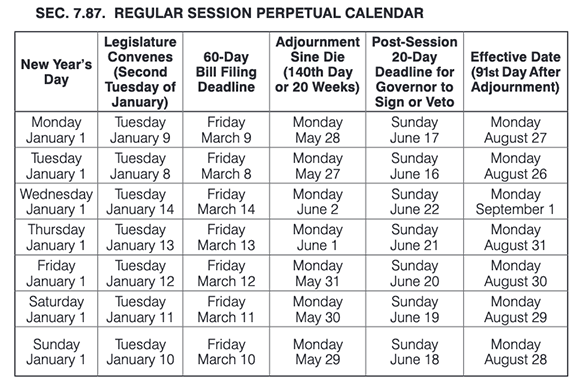Today's Committee Meetings on the LRL website is a calendar of interim committee hearings with links to agendas. Below are resources related to upcoming Interim Hearings.
Charge: Adult Learner Students: Examine existing innovative programs in higher education institutions that assist non-traditional students in completing a degree or credential, including first-time adult learners, re-enrolling students, first generation students, working adults, and at-risk students. Provide recommendations on methods the state can use to partner with higher education institutions to expand successful programs throughout the state.
- "To Better Serve Adult Learners, Eliminate the Barriers Between Work and Learning," EdSurge, January 30, 2020
- Interim Report to the 85th Legislature (Charge 6 – Non-traditional students), House Committee on Higher Education, January 2017
- Adult Learners and Non-Traditional Students (Presentation by Commissioner Raymund A. Paredes to House Committee on Higher Education), Texas Higher Education Coordinating Board, June 21, 2016
- Interim Report (Charge 5 – Non-traditional students), Senate Committee on Higher Education, December 2012
Charge: Data Transparency: Explore methods to improve data sharing and transparency among state agencies, school districts and charter schools, and higher education institutions. Consider best practices to increase the ability of high schools and higher education institutions to support student post-secondary access and degree completion and how to provide policymakers with data on each. Recommend methods of integrating existing data systems at the K-12 and higher education levels to provide real-time support and direction for students.
Charge: Monitoring: Monitor the implementation of legislation addressed by the Senate Committee on Higher Education passed by the 86th Legislature, as well as relevant agencies and programs under the committee's jurisdiction. Specifically, make recommendations for any legislation needed to improve, enhance, or complete implementation of the following:
- Senate Bill 25, relating to measures to facilitate the transfer, academic progress, and timely graduation of students in higher education.
Charge: Teacher Workforce: Examine best practice models to recruit, prepare, and retain highly effective teachers. In particular, focus on methods to train and prepare educators for teaching through virtual, in-person, or a blend of methods.
- Teaching in the Time of COVID-19: State Recommendations for Educator Preparation Programs and New Teachers, State Policy Map Tracker, American Association of Colleges for Teacher Education, September 22, 2020
- Teaching & Learning in the Time of COVID-19 – Research Brief: Early Challenges and Solutions from Teachers (Distance Learning Research Brief #1), Urban Education Institute, The University of Texas at San Antonio, July 20, 2020
- COVID-19 Update: State Policy Responses and Other Executive Actions to the Coronavirus in Public Schools (Teachers, Virtual/Hybrid Learning), Education Commission of the States, May 20, 2020
- 50-State Comparison: Teacher Recruitment and Retention, Individual State Profile – Texas, Education Commission of the States, October 23, 2019
- Report to the 85th Legislature (Charge 8 – Teacher shortage and retention, Joint Charge with Senate Committee on Higher Education), Senate Committee on Education, November 2016
- Educator Reports and Data (Teacher Attrition and Retention), Texas Education Agency
Charge: Adult Education: Identify and evaluate current innovative programs that assist non-traditional students (first-time adult learners, re-enrolling students, working adults, and educationally disadvantaged students) in completing a high school diploma, GED, post-secondary degree, or workforce credential, including a review of adult education charter schools and their performance framework. Make recommendations to help successful expansion with partnered business and education entities.
- Prosperity Requires Being Bold: A Progress Report (Report to the Office of the Governor), Texas Education Agency, Texas Higher Education Coordinating Board, and Texas Workforce Commission, February 2020
- Understanding the Need for Adult Education in Texas, Texas Workforce Investment Council, December 2018
- State Fiscal Year 2018 Adult Education and Literacy Outcome Report to the Texas Legislature, Texas Workforce Commission
- Strategic Plan for Adult Education and Literacy FY 2018 Progress Report, Texas Workforce Commission
- The Texas GED Problem Is Getting Worse: Not Enough Texans Are Earning Their High School Equivalency, Center for Public Policy Priorities, January 2018
- Texas Adult Education and Literacy Guide, Texas Workforce Commission, July 2017
- Strategic Plan for Adult Education and Literacy for the Fiscal Year of 2015 – 2020, Texas Workforce Commission
- Interim Report (Charge 2 – Technology, includes online courses), Senate Committee on Higher Education, December 2014
- Interim Report to the 83rd Texas Legislature (Charge 4 – Adult Basic Education, Joint Charge with House Committee on Appropriations), House Committee on Higher Education, January 2013
- Adult Education, Texas Workforce Commission
This entry was posted on October 7, 2020 at 9:30 AM and has received 1434 views.
Print this entry.


